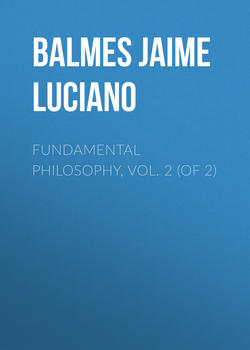Читать книгу Fundamental Philosophy, Vol. 2 (of 2) - Balmes Jaime Luciano - Страница 24
BOOK FOURTH.
ON IDEAS
CHAPTER XXIV.
EXISTENCE OF UNIVERSAL REASON
Оглавление152. General truths have some relation to particular truths; for since they are not a vain illusion, they must of necessity be connected with some object either existing or possible. Whatever exists is particular; not even possible being can be conceived of, if it be not, so to speak, particularized in the regions of possibility. God himself, being by essence, is not a being in abstract, but an infinite reality. In him, the general idea of the plenitude of being, of all perfection, of infinity, is, so to speak, particularized.
General truths would then be vain illusions did they not refer to something particular either existing or possible. Without this relation, cognition would be a purely subjective phenomenon; science would have no object; knowledge would be had, but there would be nothing known.
The appearance of knowing is never offered to us as a purely subjective fact; that is to say, when we think we know, we think we know something either within or without us, according to the matters which occupy us. Supposing, then, the phenomenon of cognition to be purely subjective, and to become objective for itself, we should have what would constantly lead us into error; for the human reason would be infected with a radical vice, which would oblige it to view these phenomena as means of perceiving the truth, whereas they are only eternal sources of deception.
153. There may arise a doubt in this correspondence of general with particular truth, as to which is the principle; that is, whether general truth is truth by means of particular truths, or the contrary. "All the diameters of a circle are equal;" this is a general truth. If we suppose a circle to exist, all its diameters will be equal. We have already seen that the certainty of the general truth neither does nor can reach us through the particular truth; but neither, on the other hand, does the particular stand in need of the general; so that it seems, that even when we abstract all intelligence, capable of perceiving this general truth, the existing circle will not cease to have all its diameters equal.
154. Moreover, if the truth fail in one single instance, it cannot be general; but the particular may be true although it fail in general. The equality of the diameters of an existing circle is, then, a condition necessary to the general truth; but the general truth is not necessary to the equality of the diameters. It is true in general that all diameters are equal, since this is verified in all either existing or possible, and the general truth is only the expression of this verification; but yet it does not appear that the diameters, in any one particular case, are equal by reason of the general truth. It is true that one particular whole is greater than one of its parts, although considered in itself, abstracted from all general truth; but it would not be true that the whole is greater than one of its parts, if in any one particular whole, the axiom should fail.
155. It would seem that from these observations we could infer that the truth of principles depends upon the truth of facts, and not vice versa. Nevertheless, if we reflect more upon this matter, we shall discover that truth is not based upon particular facts, but upon something superior to them.
I. We cannot from a particular fact infer a universal truth; but from universal truth we can infer the truth of all particular existing or possible facts. The reason why this consequence is legitimate is found in the necessary connection of the predicate and subject; and this necessity cannot be discovered in particular facts of their own nature contingent.
II. Neither can the reason of this necessity be found in the simple proposition enunciating it, since this establishes nothing, but only expresses. The enunciation is true, because it expresses the truth; but the existence of the truth does not depend upon its enunciation.
III. Nor can it depend upon our ideas; for these are not productive of things; all imaginable perceptions cannot change one iota of reality. The idea may express a thing, but does not make it. The relation of ideas with each other, in so far avails as it expresses the relation of objects; if for one moment we permit ourselves to doubt this correspondence, our reason becomes reduced to utter impotence, to a vain illusion of that which ought to be of no account. The properties of the triangle are contained in the idea we have of it; but if this idea were purely subjective, if it had no exact or approximate relation to any real or possible object, it and all that is built upon it, would be mere phenomena of our mind, would signify absolutely nothing, and would have no more weight than the ravings of a madman.
IV. The reason of necessary truths can in nowise be discovered in our understanding; every one perceives them, without thinking of others or even of himself. Truth existed before any individual; and when we shall have disappeared, it will continue the same, it will lose nothing.
V. All men, although they neither do nor can agree, perceive certain necessary truths; all individual intelligences, therefore, have drunk at some common fountain; therefore universal reason exists.
